
A selection of stories from recent UVU graduates and students
By Suzanne Broadbent and Trisha Dugovic | Photography by Jay Drowns
When President Matthew S. Holland gave his State of the University address in 2017, he described how the greatest measure of Utah Valley University's success would not be its national and international achievements, but the way it has helped its students and alumni build happy, successful lives. Here are a few of those stories from the last 10 years.
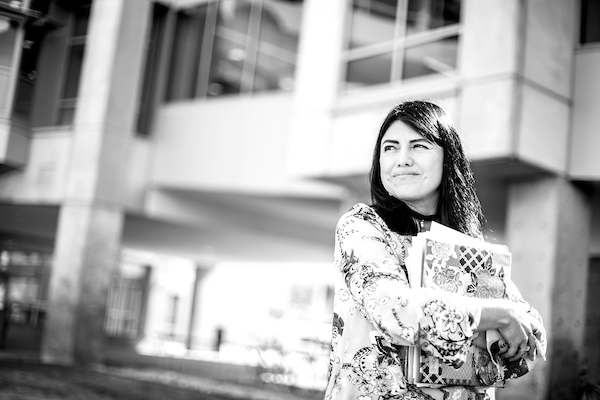
Claudia Recinos-Hales
As a Guatemalan and a first-generation student in her family to attend college, Claudia Recinos-Hales had some decisions to make when it came to choosing a university that would best meet her needs.
When Recinos-Hales married an American 25 years ago and moved to the United States, her father-in-law insisted that she learn English, which she did by taking classes here and there. But, life happened and she and her husband decided to start a family. Now, 20 years later, she decided it was time to go back to school.
Utah Valley University was close to her home and she said that she liked what she heard about the diverse student body, the inclusive environment, and the engagement the professors took to make sure each student was learning and continuing toward the path of graduation. She knew UVU was where she wanted to attend.
Recinos-Hales said that her professors have become life-long friends and each of them has taken a personal interest in her success. As a student at UVU, she has now realized that she is excellent at math and has even become a math mentor on campus. Recinos-Hales says, " If I can do it, then others can do it too."
And the loyalty isn't stopping with just Recinos-Hales. She now has two kids that are doing concurrent enrollment classes at UVU and she said they are having as good an experience as she is.
— Suzanne Broadbent
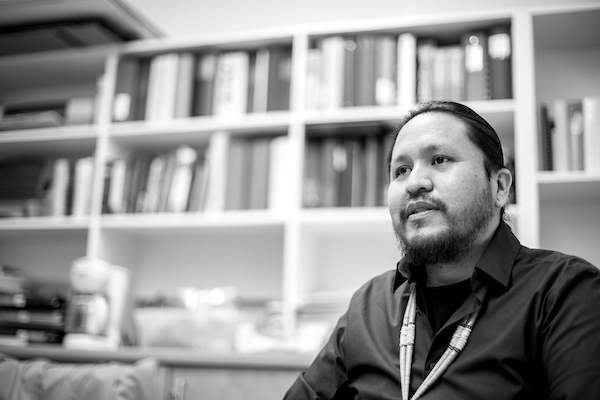
Mike Negale
It could be said that it started with an old pickup truck for Mike Negale.
While working at a grocery store to support himself through college, his Chevy Silverado needed some tender loving care. He chose to study collision repair technology at Utah Valley University in order to improve and customize his much-loved vehicle. But after Negale did better than he thought he would in his intermediate algebra class, he felt he might enjoy a different field of study he hadn't considered before.
That initial realization led Negale to a passion for mathematics and physics, culminating with dual bachelor degrees in those majors in 2011.
Discovering these new passions helped Negale realize he wasn't content with only doing the things that came easily to him, whether fixing trucks, studying, or pursuing artistic hobbies.
"I like drawing with pencil or charcoal and oil painting," Negale says. "Human faces are difficult; hands are hard to draw as well. Painting was a lot harder for me than drawing. I think getting it to where I like it is very rewarding to me. I feel like I do seek out challenges just to see if I can do it."
Negale's most recent challenge was defending his dissertation on motion in the upper atmosphere and finding evidence of connections between the upper and middle atmosphere. With that done, he will complete a doctorate in physics from Utah State University.
Negale's interest in atmospheric research stemmed from an internship at Argonne National Laboratory in Chicago during his final year at UVU. He also interned at Space Dynamics Laboratory in Logan, Utah, to prepare himself for graduate school.
During his educational career, Negale discovered another passion: a love of teaching.
While he was an undergraduate at UVU, Negale took up a weekend math tutoring position at a local church in Orem. Some children wouldn't bring any homework to work on, so Negale began creating more fun and interesting assignments than their normal math problems.
"I didn't think much of it at the time, but I liked helping these students by getting them motivated to do their homework," Negale says.
Following this experience, Negale wanted to further his teaching skills. He worked as a teacher's assistant at UVU, then he worked as an instructor, graduate teaching assistant, and physics lab instructor at USU, where he is also a graduate research assistant.
In the future, Negale says he wants to inspire younger generations to get an education, in particular Native Americans. Negale says many don't have parents who have gone to school, like Negale's mother did, to encourage them to get an education. They also may not have the opportunity or example to follow.
Because of Negale's Navajo heritage, he wants to teach physics at USU's Eastern campus in Blanding, Utah, near the Navajo reservation. He wants to encourage Navajo students to pursue or continue their education.
The old Chevy that sparked Negale's university education has since been sold and replaced with a more practical vehicle, but the truck's influence on Negale's life will last for years to come.
— Trisha Dugovic
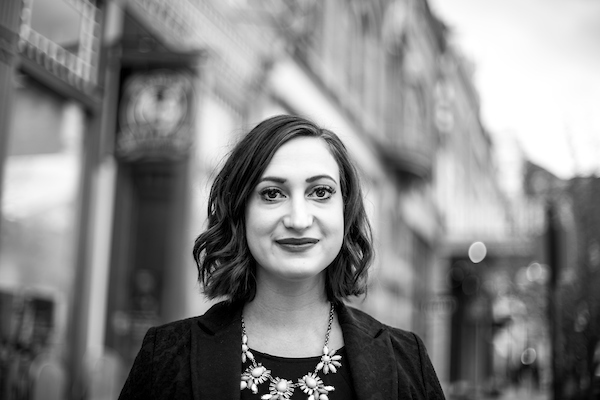
Lindsey Lewis
Lindsey Lewis always knew she wanted a career that would give her a good work-life balance. But she feared her expressive nature – as seen in her bright nail polish and loud clothing patterns – wouldn't be a good fit for something like accounting. "I have too much of a personality for accounting," she says.
After receiving acceptance letters from several universities in Utah, Lewis felt that Utah Valley University had a program that would provide the fit she was looking for.
"I specifically chose UVU," Lewis says.
In fact, Lewis can hardly contain her enthusiasm for UVU.
"I love UVU — I even have the license plates," she says, "I'm a diehard fan."
An organized and methodical planner, Lewis has had the goal of being a mother and also having a career. She took some college courses while still in high school in the medical field but decided that the work-life balance would be better in a different career. She soon found out that UVU's financial planning program would be a better fit for her after reading the program's website, which said the program had 100 percent job placement at the time.
She went on to obtain her MBA in UVU's accelerated one-year program in 2017 shortly after obtaining her bachelor's degree in 2015. "The timing felt right," Lewis says.
Following graduation, Lewis had five job offers for full-time positions, but she didn't take any of them. Instead, she went back to a company where she absolutely knew she wanted to work. The company was only offering an internship position, but Lewis convinced them to give her a full-time job.
Since then, she has found herself working in wealth management and 401(k) training, where she creates comprehensive financial plans and trains employees at various companies on investing and saving techniques.
"It sounds super boring," Lewis says, "but it's actually super cool because there is a lot of strategy involved."
What Lewis feels like she does most of the time for clients is manage their expectations about the realities of retiring and how much money they will actually need.
"My dream goal is to help millennials understand how investing at a young age can change their lives," Lewis says.
Reflecting back on her time at UVU, Lewis says, "I don't feel like I had a typical college experience because I can call any of my professors and ask them for advice."
Lewis tries to better herself personally and professionally every day and she feels that the engaged learning at UVU helped her do that.
Lewis sets four "B" goals — body, being, balance, and business — for her life each year. Her classes at UVU taught her to make her goals "SMART": specific, measurable, achievable, realistic, and timely. She puts all of her goals on a vision board, and in 2017 she accomplished most of them for that year.
"Life is always a balancing act," she says.
Lewis always told herself that "a man is not a plan," and because her mother obtained a college degree, Lewis always expected to get a degree herself. She wishes that more women and girls would see earning a degree as an expectation rather than an option.
The Women's Success Center at UVU has programs that are helping more women graduate than ever before and Lewis loves that. "They say to get 'a degree for life,'" which Lewis thinks is so important.
Lewis also endorses The Women of the Woodbury program at UVU, which promotes not only more women in education in general, but increased enrollment for women in business and entrepreneurship specifically.
"What we are really focused on is teaching women leadership skills," said Mikki O'Connor, assistant dean to the Woodbury School of Business. "Most women who come into the Woodbury School of Business finish their degrees."
Through the Women of the Woodbury program, students receive successful businesswomen as mentors to teach them how to be prepared when entering the workforce.
Lewis says that it is hard for women in business because of the various stereotypes associated with women in leadership positions such as being bossy or aggressive. She loves that UVU has these programs to help women and felt she personally benefited from these programs.
"I want to be a woman who people can reach out to as a mentor for the next generation," Lewis says. "I want to help push the needle in a way that empowers women."
— Trisha Dugovic
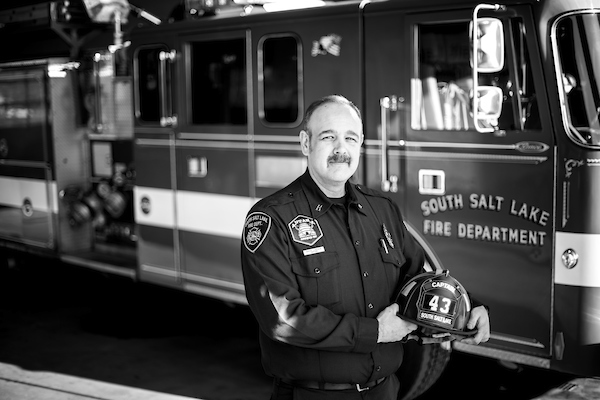
David Larsen
As a young man, David Larsen started out taking classes in criminal justice, but ended up having to drop out of school and go to work for the next 20 years. Just three years ago, he decided that it was time to go back to college and finish what he started. He earned an Associate Degree in Emergency Services/Fire Officer and then his Bachelor's in Emergency Services/Emergency Management from Utah Valley University.
Larsen said that going back to school at this point in his life still had its challenges. He had a career to balance and as a firefighter the schedule was anything but typical. Firefighters work 48 hours on and 96 hours off. And the schedule rotates. So, it was important to find a university that had a program that fit his schedule.
UVU met his needs because of the on-line classes available. Larsen was able to complete 100 percent of his courses on-line.
Larsen also became part of the emergency services club. Through this club he took an international study abroad which took him to the Balkan Islands where he was able to visit six countries. As someone who had never been out of the country, Larsen said this was an incredible experience.
The study abroad program had two components: to work with students at universities and then to work with local public safety officials.
While at the universities, he was able to teach things like how to set up a community emergency response team (CERT) and run that through the Federal Emergency Management Agency (FEMA).
During the time Larsen was able to work with local public safety officials, like their firefighters. UVU was able to foster a relationship with the government with the intent to do some future exchanges of students and share programs.
Since graduating, Larsen has become vice chairman of the Joint Fire Service of Utah. In this position, he looks at any piece of legislations that has to do with the fire service and lobbies for or against it.
"The emergency services program at UVU does an excellent job at making it easily accessible and available to working professionals," Larsen says. "The program has been very well designed to accommodate these people."
— Suzanne Broadbent
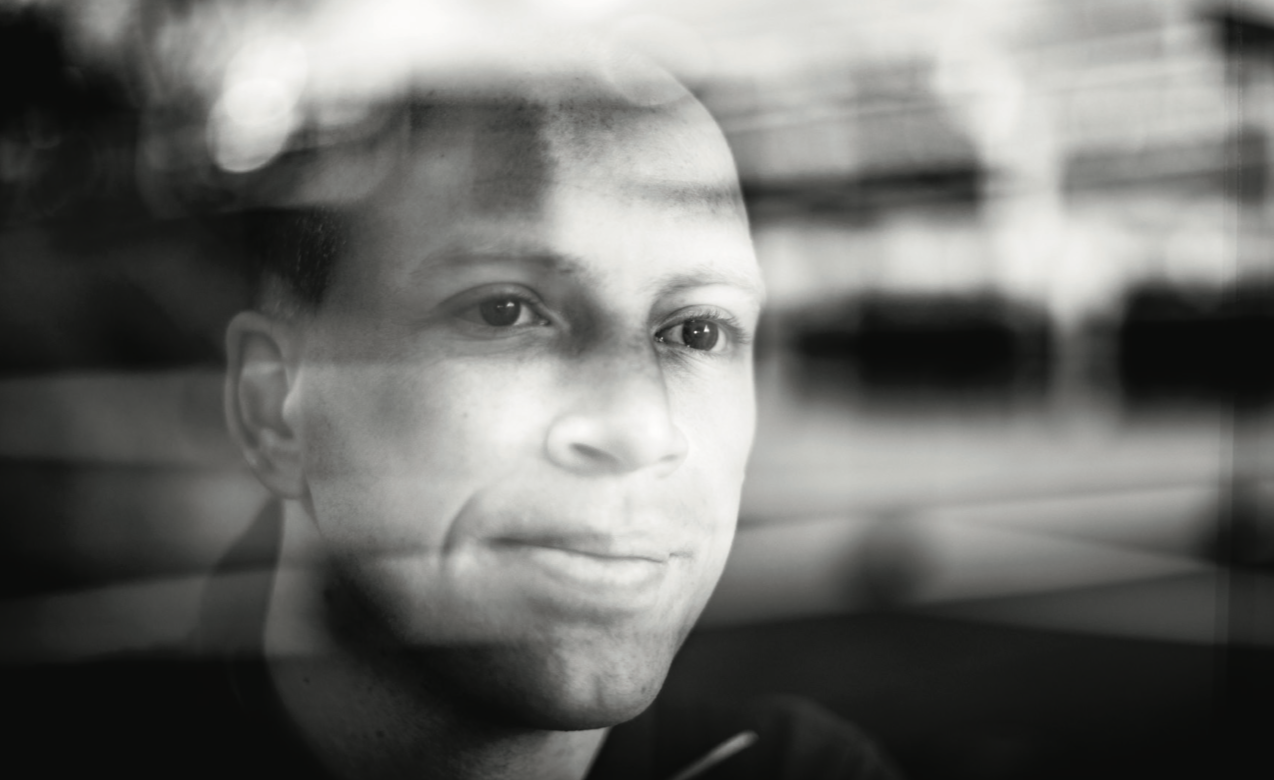
Jordan Byrd
You will often find Jordan Byrd listening to music, making light of life and all that comes with it.
"I listen to metal, rap, pop, Christmas music," Byrd says, smiling. "I listen to whatever has a good beat and vibe."
You'll also find Byrd typing away on his personal blog, "Moving Forward Despite Setbacks," which he began writing about his brain trauma that he experienced when his life was just beginning.
An oxygen deficiency at birth led to a life-altering brain injury for Byrd. Doctors said that he would never be able to read, write, or communicate. Byrd worked every day to learn through every difficulty he experienced, and continued on through school, where he says he needed more support than was offered. He relied heavily on his parents to help teach him each day after school, and as a result, he was able to graduate high school and move on to Utah Valley University, where he is today. Needless to say, he hasn't let any of his setbacks get in the way of his life or education.
"I still deal with it today; it will never go away," Byrd says.
At first, Byrd didn't understand how his brain trauma was more helpful to him than it was a hindrance, but he says he later saw what he had been missing.
"It helped me become who I am and to be a hard worker," Byrd says. "I am able to adapt to situations quickly, anticipate things, and learn from anybody."
When he first started his college career, Byrd sought help from UVU's Office of Accessibility Services, which offers accommodations to students based on their needs. Byrd visited the office to assess if he needed or wanted help, but because of the supportive nature of the professors at UVU and as a result of his self-sufficient spirit, he concluded he could do it on his own.
"That's what I like about UVU — the professors here are willing to help you out," Byrd says. "You can go to them and talk with them, which has been helpful to my success."
Byrd attributes the ability to talk to professors as the number one reason he has been successful at UVU.
Byrd began his undergraduate degree in digital media, but decided to change to technology management with a minor in digital media.
Initially, Byrd wanted to work his way up in a tech company in Utah after graduation. In order to get a job, though, he felt he was lacking understanding on the business side of things. That motivated him to continue his schooling and obtain a Master of Business Administration.
Byrd's goals now include gaining experience in the workforce and eventually starting his own business. He also seemingly can't get enough of learning, as he now looks toward earning a doctorate.
Byrd says he never received the kind of support he needed to succeed in the school system prior to UVU, so he looks forward to starting a resource center for those with brain traumas, brain disabilities, and the like. He wants this center to be a place that shows people they can still succeed, despite the disabilities they may have.
"I want to be able to take what I've learned and go help someone else," Byrd says. "I want them to come [to the resource center] and learn how to deal with their situations so they can feel like there is hope, because I didn't really have that growing up as much."
Soon, Byrd will be helping others move forward despite their setbacks.
— Trisha Dugovic
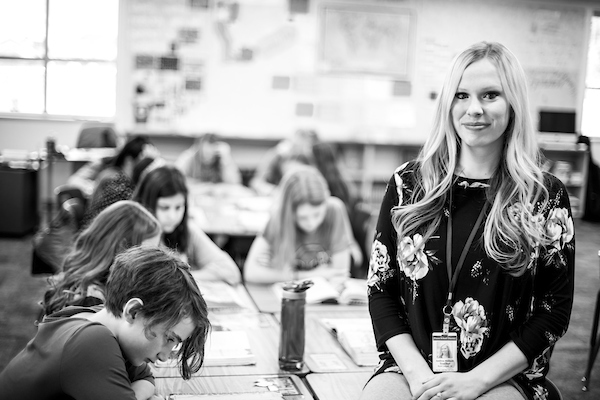
Andrea Neilson
While attending a college program with Walt Disney World, Andrea Neilson realized that she loved working with children, but she wanted to educate and teach rather than just entertain them.
With that in mind, she chose to enroll in the two-year elementary education program at Utah Valley University. Neilson attributes much of her success at UVU to the engagement her professors had with her. She recalls Ann Sharp and Dr. Bird specifically as professors that were personable and "made learning really fun." In fact, Neilson has used examples from her professors at UVU and incorporated those styles into her own classrooms.
Neilson also remembers meeting UVU President Matthew S. Holland at a local restaurant, where she was working while attending school. He had just been announced as the new president of UVU. She introduced herself as a student and said he spent a lot of time visiting with her and discussing her education.
Neilson graduated from UVU with a bachelor's degree in elementary education in 2012. At that time, Utah had a surplus of educators, and the marketplace for a job was competitive. However, she was able to secure a position as a sixth-grade teacher at her first choice of schools: Rock Canyon Elementary in Provo.
Neilson has enjoyed teaching at Rock Canyon for the past six years and was recently named Rock Canyon Elementary Teacher of the Year. She says she loves her students and has made a concerted effort to be an engaged educator to assure their success.
— Suzanne Broadbent
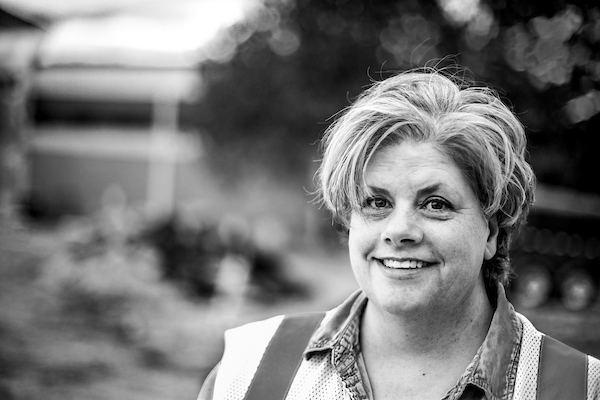
Laura Towner
As a young girl who grew up working for her dad's construction company, Laura Towner was assigned to work in the office, as a construction site for a woman was taboo at the time. However, by the time she was 48, she knew she wasn't happy with her job as an administrator and decided to do something about it.
Towner came to Utah Valley University and met with the Women's Success Center to get more information about coming back to school. Towner was motivated by the encouragement and guidance she received from the center. She agreed with the center's motto that "every woman deserves the confidence, opportunity, and knowledge that comes with a college degree."
Towner started back to school by just taking a couple of night courses, but after a couple of semesters she jumped into school full-time. Eric Linfield, the department chair, was very encouraging to Towner which she appreciated because there were very few women in the program. Linfield made sure that she knew about available scholarships.
As a non-traditional student Towner realized that there was a lot of support for her. And because of the emphasis on diversity at UVU, she felt very comfortable in the construction management program as a woman and as someone going back to school later in life.
Towner graduated with her bachelor degree in construction management in 2017. She was immediately hired as the superintendent for the commercial division at Rod Lewis Construction. In fact, her first project from the ground up was the hall of flags on UVU campus.
"There is a path for non-traditional students to graduate through UVU," Towner said. And she is looking forward to many years of a rewarding career as a result of obtaining her degree.